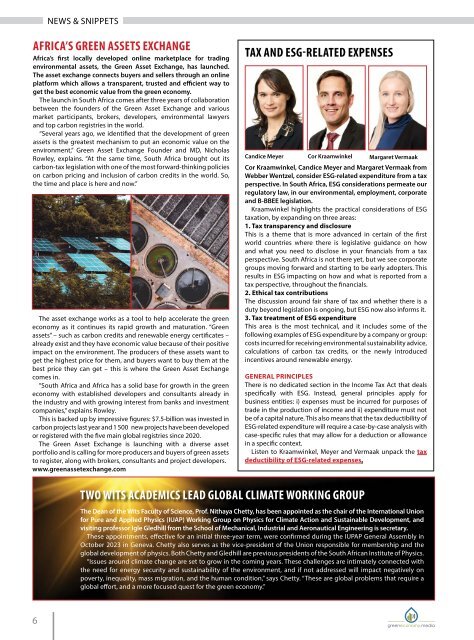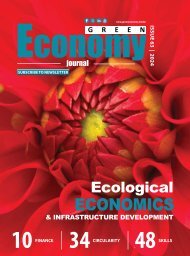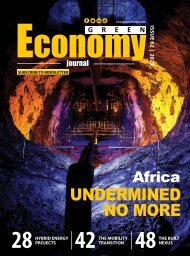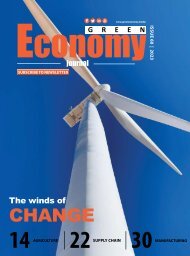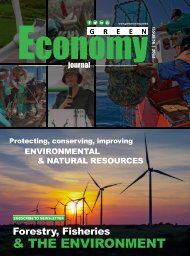Green Economy Journal Issue 61
Create successful ePaper yourself
Turn your PDF publications into a flip-book with our unique Google optimized e-Paper software.
NEWS & SNIPPETS<br />
AFRICA’S GREEN ASSETS EXCHANGE<br />
Africa’s first locally developed online marketplace for trading<br />
environmental assets, the <strong>Green</strong> Asset Exchange, has launched.<br />
The asset exchange connects buyers and sellers through an online<br />
platform which allows a transparent, trusted and efficient way to<br />
get the best economic value from the green economy.<br />
The launch in South Africa comes after three years of collaboration<br />
between the founders of the <strong>Green</strong> Asset Exchange and various<br />
market participants, brokers, developers, environmental lawyers<br />
and top carbon registries in the world.<br />
“Several years ago, we identified that the development of green<br />
assets is the greatest mechanism to put an economic value on the<br />
environment,” <strong>Green</strong> Asset Exchange Founder and MD, Nicholas<br />
Rowley, explains. “At the same time, South Africa brought out its<br />
carbon-tax legislation with one of the most forward-thinking policies<br />
on carbon pricing and inclusion of carbon credits in the world. So,<br />
the time and place is here and now.”<br />
The asset exchange works as a tool to help accelerate the green<br />
economy as it continues its rapid growth and maturation. “<strong>Green</strong><br />
assets” – such as carbon credits and renewable energy certificates –<br />
already exist and they have economic value because of their positive<br />
impact on the environment. The producers of these assets want to<br />
get the highest price for them, and buyers want to buy them at the<br />
best price they can get – this is where the <strong>Green</strong> Asset Exchange<br />
comes in.<br />
“South Africa and Africa has a solid base for growth in the green<br />
economy with established developers and consultants already in<br />
the industry and with growing interest from banks and investment<br />
companies,” explains Rowley.<br />
This is backed up by impressive figures: $7.5-billion was invested in<br />
carbon projects last year and 1 500 new projects have been developed<br />
or registered with the five main global registries since 2020.<br />
The <strong>Green</strong> Asset Exchange is launching with a diverse asset<br />
portfolio and is calling for more producers and buyers of green assets<br />
to register, along with brokers, consultants and project developers.<br />
www.greenassetexchange.com<br />
TAX AND ESG-RELATED EXPENSES<br />
Candice Meyer Cor Kraamwinkel Margaret Vermaak<br />
Cor Kraamwinkel, Candice Meyer and Margaret Vermaak from<br />
Webber Wentzel, consider ESG-related expenditure from a tax<br />
perspective. In South Africa, ESG considerations permeate our<br />
regulatory law, in our environmental, employment, corporate<br />
and B-BBEE legislation.<br />
Kraamwinkel highlights the practical considerations of ESG<br />
taxation, by expanding on three areas:<br />
1. Tax transparency and disclosure<br />
This is a theme that is more advanced in certain of the first<br />
world countries where there is legislative guidance on how<br />
and what you need to disclose in your financials from a tax<br />
perspective. South Africa is not there yet, but we see corporate<br />
groups moving forward and starting to be early adopters. This<br />
results in ESG impacting on how and what is reported from a<br />
tax perspective, throughout the financials.<br />
2. Ethical tax contributions<br />
The discussion around fair share of tax and whether there is a<br />
duty beyond legislation is ongoing, but ESG now also informs it.<br />
3. Tax treatment of ESG expenditure<br />
This area is the most technical, and it includes some of the<br />
following examples of ESG expenditure by a company or group:<br />
costs incurred for receiving environmental sustainability advice,<br />
calculations of carbon tax credits, or the newly introduced<br />
incentives around renewable energy.<br />
GENERAL PRINCIPLES<br />
There is no dedicated section in the Income Tax Act that deals<br />
specifically with ESG. Instead, general principles apply for<br />
business entities: i) expenses must be incurred for purposes of<br />
trade in the production of income and ii) expenditure must not<br />
be of a capital nature. This also means that the tax deductibility of<br />
ESG-related expenditure will require a case-by-case analysis with<br />
case-specific rules that may allow for a deduction or allowance<br />
in a specific context.<br />
Listen to Kraamwinkel, Meyer and Vermaak unpack the tax<br />
deductibility of ESG-related expenses.<br />
TWO WITS ACADEMICS LEAD GLOBAL CLIMATE WORKING GROUP<br />
The Dean of the Wits Faculty of Science, Prof. Nithaya Chetty, has been appointed as the chair of the International Union<br />
for Pure and Applied Physics (IUAP) Working Group on Physics for Climate Action and Sustainable Development, and<br />
visiting professor Igle Gledhill from the School of Mechanical, Industrial and Aeronautical Engineering is secretary.<br />
These appointments, effective for an initial three-year term, were confirmed during the IUPAP General Assembly in<br />
October 2023 in Geneva. Chetty also serves as the vice-president of the Union responsible for membership and the<br />
global development of physics. Both Chetty and Gledhill are previous presidents of the South African Institute of Physics.<br />
“<strong>Issue</strong>s around climate change are set to grow in the coming years. These challenges are intimately connected with<br />
the need for energy security and sustainability of the environment, and if not addressed will impact negatively on<br />
poverty, inequality, mass migration, and the human condition,” says Chetty. “These are global problems that require a<br />
global effort, and a more focused quest for the green economy.”<br />
TAKE-OUTS: PACKAGING WASTE<br />
Liquid board packaging colloquium hosted by Fibre Circle.<br />
“We are facing a crisis in waste management with fast diminishing<br />
landfill airspace, and we all have a role to play in finding sustainable<br />
solutions that not only divert waste from landfill but create the<br />
much-needed jobs for the South African economy,” says Edith<br />
Leeuta, CEO, Fibre Circle.<br />
Key takeouts:<br />
• Diversion from landfill. Agreement needs to be reached on<br />
how targets are going to be reached and the collaboration<br />
required to achieve set targets.<br />
• Public-private sector partnership is critical to preserve the<br />
environment and so that investment is made to educate all South<br />
Africans. Links between the industry and academic institutions<br />
need to be strengthened. Municipalities must ensure that their<br />
integrated waste management plans enable separation at source<br />
to promote the collection of recyclable materials. Municipalities<br />
must provide consistent services to all citizens in the collections<br />
value chain.<br />
• Infrastructure is a key priority. There has been little or no<br />
investment in infrastructure for several years. Without waste<br />
processing infrastructure, high volumes of different kinds of<br />
waste cannot be processed.<br />
• Investment is problematic. Considerable investment is needed<br />
PEOPLE-PLANET-PROFIT BALANCE<br />
By Siphokazi Kayana and Nomfundo Mkatshwa-Jackson, CMS South Africa<br />
It has become necessary for companies to prioritise sustainability<br />
amidst the threat of climate change. Countries have thus sought<br />
to develop regulations in various fields including environmental<br />
footprint, market/product communication and financial reporting<br />
for companies. Partly because of those regulations, companies are<br />
increasingly being held legally accountable from different angles<br />
with respect to their role in climate change – ESG litigation.<br />
ESG litigation focuses on larger companies with a wide-reaching<br />
footprint and its primary goal is to bring about behavioural change in<br />
companies. Companies are often publicly held accountable through<br />
various media campaigns. It is not just environmental organisations<br />
that are acting as consumers; investors, shareholders and local<br />
communities are increasingly vocal about taking action.<br />
Climate litigation has doubled globally since 2015, bringing the<br />
total number of climate lawsuits to some 2 000 – 25% of which were<br />
initiated between 2020 and 2022.<br />
KEY TRENDS<br />
Infringement of climate law. There is no international binding<br />
convention on business and human rights. In Europe, however, a<br />
great deal of ESG legislation is under preparation, including the<br />
Proposal of the European Commission of 23 February 2022 for a<br />
Directive on Corporate Sustainability Due Diligence. The legislative<br />
process is expected to take a while longer, as such, a final directive<br />
is not likely to enter into force until 2025/2026. The obligations to<br />
be embedded in this directive are, however, already largely part<br />
of existing soft law standards ensuing from previous international<br />
conventions.<br />
Conversely, the regulations formulated by intergovernmental<br />
organisations are integrated into domestic laws, thereby heightening<br />
the potential for sanctions and legal disputes. The integration<br />
of such international regulations into national legislation holds<br />
significant importance, particularly for jurisdictions outside of the<br />
EU, as it directly shapes the trends observed in ESG litigation.<br />
NEWS & SNIPPETS<br />
to improve municipal waste management capabilities. Privatesector<br />
investment is essential.<br />
• Transition to a circular economy needs to be inclusive.<br />
Informal waste pickers need to be integrated into the waste<br />
management system as it becomes more circular.<br />
• Separation at source is critical. Given the various challenges<br />
at municipal landfill sites, households must be persuaded to<br />
separate their waste so that paper and packaging waste is not<br />
contaminated by other waste materials.<br />
• Incentivisation is key. The industry needs to produce ways to<br />
incentivise citizens to play their role, particularly in underprivileged<br />
areas. Incentivisation will also make it more likely that waste<br />
pickers will collect more types of<br />
packaging waste.<br />
• Government has a key role<br />
to play. Government needs<br />
to ensure that compliance<br />
and enforcement are<br />
carried out for those<br />
organisations that<br />
choose to ignore regulations.<br />
Municipal by-laws should<br />
promote separation at source.<br />
Misleading market communication and financial information. The<br />
greening trend entails the inevitable risk that companies advertise<br />
financial instruments and products as greener and more sustainable<br />
than they are. Companies must be aware of the risk of providing<br />
misleading market communication and financial information,<br />
known as “greenwashing”.<br />
Misleading product information may constitute a wrongful<br />
act. The CSRD Directive requires large companies to report on<br />
issues such as carbon emissions and social capital, but also about<br />
the impact that a company has on biodiversity and human rights<br />
violations in the supply chain.<br />
Pollution of, and damage to, the direct environment. Companies<br />
may be held accountable by local communities for polluting or causing<br />
damage to, the direct environment. This can be done through a class<br />
action. Such claims will be based on wrongful acts in combination<br />
with environmental legislation.<br />
Shareholders’ actions. Shareholders are increasingly exercising<br />
their rights for ESG purposes to force the board of directors to act,<br />
for example, their right to place items on the agenda, to speak<br />
or to vote on the appointment or dismissal of directors or their<br />
remuneration policy.<br />
Personal liability of directors. An international trend is that,<br />
in addition to holding the company liable to exert pressure, the<br />
board of directors of a company is also held personally liable for<br />
compliance with the company’s ESG obligations. This relates to (i)<br />
personal involvement/negligence in violated standards; and (ii)<br />
improper climate change policy.<br />
The need for action to protect our planet has prompted intergovernmental<br />
organisations and lawmakers to establish clearer<br />
standards determining the extent to which businesses can impact<br />
the environment while pursuing their operations.<br />
We stand at a crucial point in history, necessitating the<br />
implementation of rules that uphold the values of people, planet<br />
and profit in equal measure.<br />
6 7


